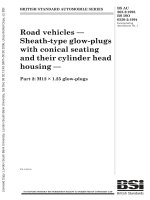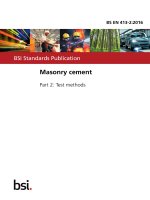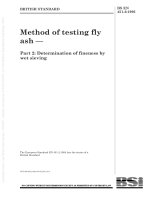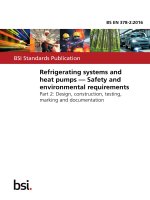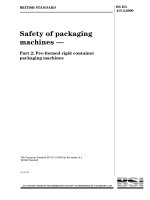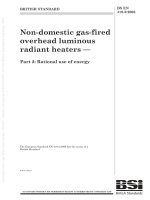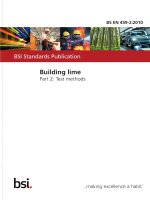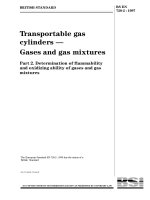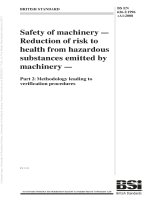Bsi bs en 50290 2 30 2002
Bạn đang xem bản rút gọn của tài liệu. Xem và tải ngay bản đầy đủ của tài liệu tại đây (150.21 KB, 8 trang )
BRITISH STANDARD
Communication
cables —
Part 2-30: Common design rules and
construction —
Poly(tetrafluoroethylenehexafluoropropylene) (FEP) insulation
and sheathing
The European Standard EN 50290-2-30:2002 has the status of a
British Standard
ICS 29.060.20; 33.120
NO COPYING WITHOUT BSI PERMISSION EXCEPT AS PERMITTED BY COPYRIGHT LAW
BS EN
50290-2-30:2002
BS EN 50290-2-30:2002
National foreword
This British Standard is the official English language version of
EN 50290-2-30:2002.
The UK participation in its preparation was entrusted by Technical Committee
EPL/46, Cables, wires and waveguide, RF connectors and accessories for
communication and signalling, to Subcommittee EPL/46/1, Communication
cables, which has the responsibility to:
—
aid enquirers to understand the text;
—
present to the responsible European committee any enquiries on the
interpretation, or proposals for change, and keep the UK interests
informed;
—
monitor related international and European developments and
promulgate them in the UK.
A list of organizations represented on this subcommittee can be obtained on
request to its secretary.
Cross-references
The British Standards which implement international or European
publications referred to in this document may be found in the BSI Standards
Catalogue under the section entitled “International Standards Correspondence
Index”, or by using the “Find” facility of the BSI Standards Electronic
Catalogue.
A British Standard does not purport to include all the necessary provisions of
a contract. Users of British Standards are responsible for their correct
application.
Compliance with a British Standard does not of itself confer immunity
from legal obligations.
This British Standard, having
been prepared under the
direction of the
Electrotechnical Sector Policy
and Strategy Committee, was
published under the authority
of the Standards Policy and
Strategy Committee on
22 March 2002
Summary of pages
This document comprises a front cover, an inside front cover, the EN title page,
pages 2 to 5 and a back cover.
The BSI copyright date displayed in this document indicates when the
document was last issued.
Amendments issued since publication
Amd. No.
© BSI 22 March 2002
ISBN 0 580 39321 6
Date
Comments
EUROPEAN STANDARD
EN 50290-2-30
NORME EUROPÉENNE
EUROPÄISCHE NORM
January 2002
ICS 29.035.20; 33.120.10
English version
Communication cables
Part 2-30: Common design rules and construction Poly(tetrafluoroethylene-hexafluoropropylene) (FEP)
insulation and sheathing
Câbles de communication
Partie 2-30: Règles de conception
communes et construction Poly(tétrafluoroéthylènehexafluoropropylène) (FEP) pour
enveloppes isolantes et gainage
Kommunikationskabel
Teil 2-30: Gemeinsame Regeln für
Entwicklung und Konstruktion Poly(tetrafluoroethylenHexafluoropropylen) (FEP) Isolierung- und
Mantelmischungen
This European Standard was approved by CENELEC on 2001-11-01. CENELEC members are bound to
comply with the CEN/CENELEC Internal Regulations which stipulate the conditions for giving this European
Standard the status of a national standard without any alteration.
Up-to-date lists and bibliographical references concerning such national standards may be obtained on
application to the Central Secretariat or to any CENELEC member.
This European Standard exists in three official versions (English, French, German). A version in any other
language made by translation under the responsibility of a CENELEC member into its own language and
notified to the Central Secretariat has the same status as the official versions.
CENELEC members are the national electrotechnical committees of Austria, Belgium, Czech Republic,
Denmark, Finland, France, Germany, Greece, Iceland, Ireland, Italy, Luxembourg, Malta, Netherlands,
Norway, Portugal, Spain, Sweden, Switzerland and United Kingdom.
CENELEC
European Committee for Electrotechnical Standardization
Comité Européen de Normalisation Electrotechnique
Europäisches Komitee für Elektrotechnische Normung
Central Secretariat: rue de Stassart 35, B - 1050 Brussels
© 2002 CENELEC - All rights of exploitation in any form and by any means reserved worldwide for CENELEC members.
Ref. No. EN 50290-2-30:2002 E
EN 50290-2-30:2002
–2–
Foreword
This European Standard was prepared by a joint working group of the Technical Committees CENELEC
TC 46X, Communication cables, and CENELEC TC 86A, Optical fibres and optical fibre cables.
The text of the draft was submitted to the Unique Acceptance Procedure and was approved by CENELEC as
EN 50290-2-30 on 2001-11-01.
The following dates were fixed:
– latest date by which the EN has to be implemented
at national level by publication of an identical
national standard or by endorsement
(dop)
2002-08-01
– latest date by which the national standards conflicting
with the EN have to be withdrawn
(dow)
2004-08-01
Annexes designated "normative" are part of the body of the standard.
In this standard, annex A is normative.
This European Standard has been prepared under the European Mandate M/212 given to CENELEC by the
European Commission and the European Free Trade Association.
__________
–3–
EN 50290-2-30:2002
1 Scope
This Part 2-30 of EN 50290 gives specific requirements for poly(tetrafluoroethylene-hexafluoropropylene)
(FEP) insulation and sheathing used in communication cables.
It is to be read in conjunction with Part 2-20 of EN 50290.
2 Normative references
This European Standard incorporates by dated or undated reference, provisions from other publications.
These normative references are cited at the appropriate places in the text and the publications are listed
hereafter. For dated references, subsequent amendments to or revisions of any of these publications apply to
this European Standard only when incorporated in it by amendment or revision. For undated references the
latest edition of the publication referred to applies (including amendments).
EN 60811-1-1:1995
Insulating and sheathing materials of electric cables - Common test methods
Part 1: General application -- Section 1: Measurement of thickness and overall
dimensions - Tests for determining the mechanical properties (IEC 60811-1-1:1993)
EN 60811-1-2:1995
Insulating and sheathing materials of electric cables - Common test methods
Part 1: General application -- Section 2: Thermal ageing methods
(IEC 60811-1-2:1985 + corr. May 1986 + A1:1989)
EN 60811-1-3:1995
Insulating and sheathing materials of electric cables - Common test methods
Part 1-3: General application - Methods for determining the density - Water
absorption tests - Shrinkage test (IEC 60811-1-3:1993)
EN 60811-1-4:1995
Insulating and sheathing materials of electric cables - Common test methods
Part 1-4: General application - Tests at low temperature
(IEC 60811-1-4:1985 + corr. May 1986 + A1:1993)
EN 60811-3-1:1995
Insulating and sheathing materials of electric cables - Common test methods
Part 3-1: Methods specific to PVC compounds - Pressure test at high temperature Tests for resistance to cracking (IEC 60811-3-1:1985 + corr. May 1986)
IEC 60093:1980
Methods of test for volume resistivity and surface resistivity of solid electrical
insulating materials
IEC 60250:1969
Recommended methods for the determination of the permittivity and dielectric
dissipation factor of electrical insulating materials at power, audio and radio
frequencies including metre wavelengths
ISO 11357-3:1999
Plastics -- Differential scanning calorimetry (DSC) -- Part 3: Determination of
temperature and enthalpy of melting and crystallization
3
www.bzfxw.com
Requirements
In case of specific applications, additional performances could be needed. Relevant test methods and
requirements shall be included in the detail specifications of the cables.
EN 50290-2-30:2002
–4–
Table 1 – FEP insulation and sheathing compounds
Characteristics
Test method
Unit
Requirements
1
Maximum rated temperature at cable for
which the compound can be used
ISO 11357-3
°C
200
2
Density
EN 60811-1-3
g/cm3
2,15 ± 0,03
3
Melting point
°C
265 ± 20
4
Mechanical characteristics
MPa
10
%
200
°C
h
240 ± 5
14*24
Mpa
%
10
25
4.1
In state of delivery
4.11
Tensile strength
- median, min.
EN 60811-1-1
Elongation at break
- median, min.
EN 60811-1-1
4.12
4.2
4.21
4.22
5
After ageing
Ageing conditions
- temperature
- duration
EN 60811-1-2
Tensile strength
- median, min.
- variation, max.
EN 60811-1-1
Elongation at break
- median, min.
EN 60811-1-1
Heat shock
EN 60811-3-1
Test conditions
- temperature
- duration
www.bzfxw.com
%
200
°C
h
250 ± 5
6
Result to be obtained
6
Behaviour at low temperature
No crack
EN 60811-1-4
Bending at low temperature
Test conditions
- temperature
°C
Result to be obtained
7
Volume resistivity, min.
No crack
IEC 60093
- at max. rated temperature at cable
- at 20 °C
8
Dielectric constant, max.
W.m
W.m
Dissipation factor, max.
- at 50 kHz, 23 °C
- at 100 kHz, 23 °C
1016
1017
IEC 60250
- at 50 kHz, 23 °C
- at 100 kHz, 23 °C
9
- 15 ± 2
2,1
2,1
IEC 60250
4 x 10-4
6 x 10-4
–5–
EN 50290-2-30:2002
Annex A
(normative)
Volume resistivity
This test shall be made on insulated conductor sample.
The sample shall be immersed in water previously heated to the specified temperature, a length of about
0,25 m at each end of the sample being kept above the water.
A DC voltage of between 80 V and 500 V shall be then applied between the conductor and the water.
The insulation resistance shall be measured 1 min after application of the voltage.
The volume resistivity shall be calculated from the measured insulation resistance by the following
formula :
r=
2plR
D
loge
d
where
H =
R=
l =
D=
d=
volume resistivity, in 9 meters
measured insulation resistance, in 9
length of the sample, in meters
outer diameter of the insulation, in mm
inner diameter of the insulation, in mm
www.bzfxw.com
BS EN
50290-2-30:2002
BSI — British Standards Institution
BSI is the independent national body responsible for preparing
British Standards. It presents the UK view on standards in Europe and at the
international level. It is incorporated by Royal Charter.
Revisions
British Standards are updated by amendment or revision. Users of
British Standards should make sure that they possess the latest amendments or
editions.
It is the constant aim of BSI to improve the quality of our products and services.
We would be grateful if anyone finding an inaccuracy or ambiguity while using
this British Standard would inform the Secretary of the technical committee
responsible, the identity of which can be found on the inside front cover.
Tel: +44 (0)20 8996 9000. Fax: +44 (0)20 8996 7400.
BSI offers members an individual updating service called PLUS which ensures
that subscribers automatically receive the latest editions of standards.
Buying standards
Orders for all BSI, international and foreign standards publications should be
addressed to Customer Services. Tel: +44 (0)20 8996 9001.
Fax: +44 (0)20 8996 7001. Email: Standards are also
available from the BSI website at .
In response to orders for international standards, it is BSI policy to supply the
BSI implementation of those that have been published as British Standards,
unless otherwise requested.
Information on standards
www.bzfxw.com
BSI provides a wide range of information on national, European and
international standards through its Library and its Technical Help to Exporters
Service. Various BSI electronic information services are also available which give
details on all its products and services. Contact the Information Centre.
Tel: +44 (0)20 8996 7111. Fax: +44 (0)20 8996 7048. Email:
Subscribing members of BSI are kept up to date with standards developments
and receive substantial discounts on the purchase price of standards. For details
of these and other benefits contact Membership Administration.
Tel: +44 (0)20 8996 7002. Fax: +44 (0)20 8996 7001.
Email:
Information regarding online access to British Standards via British Standards
Online can be found at />Further information about BSI is available on the BSI website at
.
Copyright
Copyright subsists in all BSI publications. BSI also holds the copyright, in the
UK, of the publications of the international standardization bodies. Except as
permitted under the Copyright, Designs and Patents Act 1988 no extract may be
reproduced, stored in a retrieval system or transmitted in any form or by any
means – electronic, photocopying, recording or otherwise – without prior written
permission from BSI.
BSI
389 Chiswick High Road
London
W4 4AL
This does not preclude the free use, in the course of implementing the standard,
of necessary details such as symbols, and size, type or grade designations. If these
details are to be used for any other purpose than implementation then the prior
written permission of BSI must be obtained.
Details and advice can be obtained from the Copyright & Licensing Manager.
Tel: +44 (0)20 8996 7070. Fax: +44 (0)20 8996 7553.
Email:
